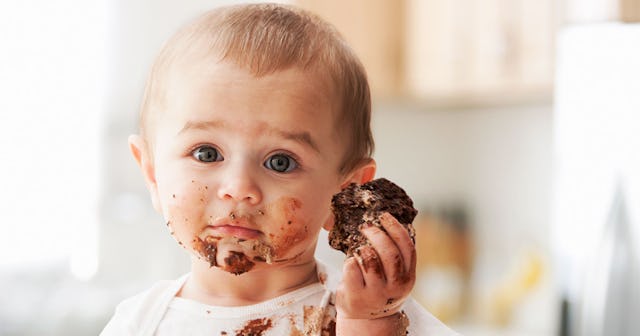LOL: New U.S. Dietary Guidelines Say No Candy Or Cake For Kids Under 2

That distant cackling you hear is every parent of toddlers losing it because of these new dietary guidelines
Because parents of young children don’t have enough to worry about, the U.S. government decided to create its first dietary guidelines for infants and toddlers. They are officially against giving children under two any added sugar, so if you’ve given your toddler watered-down juice, first birthday cake, or literally anything that real children should be able to eat and enjoy, well, you’d better turn in your Good Parent card ASAP.
No one is going to argue that well-balanced foods aren’t important in a child’s life. Of course they are. But let’s get real here: we’ve all given our one-year-olds added sugar. And no one should feel bad about that.
RELATED: Deciphering And Deciding On Baby’s First Foods — A Guide For Moms From Moms
The guidelines recommend feeding only breast milk for at least six months and no added sugar for children under age 2. “It’s never too early to start,” Barbara Schneeman, a nutritionist at University of California, Davis told HuffPost. “You have to make every bite count in those early years.”
The rest of the guidelines are pretty standard: only breastmilk or iron-fortified formula until a child reaches six months of age, and limiting added sugar to less than 10% of calories per day after age 2.
Babies can start trying other foods around six months, and potential allergenic foods should be introduced alongside “safe” foods. “Introducing peanut-containing foods in the first year reduces the risk that an infant will develop a food allergy to peanuts,” the guidelines say.
In order to promote brain development in their babies, pregnant and breastfeeding women should eat 8 to 12 ounces of seafood per week. Pregnant women should not drink alcohol, according to the guidelines, and breastfeeding women should be cautious. Caffeine in modest amounts appears safe and women can discuss that with their doctors, yadda yadda yadda.
While most parents aren’t feeding their babies a non-stop diet of Oreos and Capri Suns, placing so much emphasis on an anti-sugar message under the guise of “preventing childhood obesity” is a tricky line to toe. Is it important to introduce nutritious foods to children? Yes. Do we really want the “don’t want my kids to get fat” mentality ingrained in us when our children aren’t even two years old? HELL to the no. And as we all know, health comes in all shapes and sizes.
In short, offer your little tiny humans fruits, proteins, fats, and veggies, sure. But don’t feel the least bit guilty in giving them a chocolate chip cookie or a few bites of birthday cake because the U.S. Department of Agriculture says not to. Developing nutritional habits is important to start at a young age, but obsessing about every single morsel of food we ingest also starts at home, and way younger than most people realize.
Now excuse me while I hand my 16-month-old a leftover pizzelle from Christmas Eve so I can finish up this story.
This article was originally published on